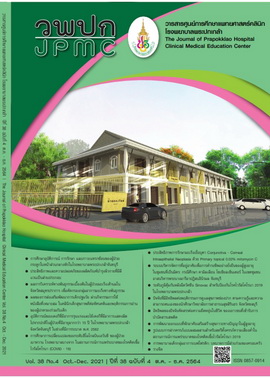Development of House Design to Enhance Intellectual Well - Being in The Elderly
Main Article Content
Abstract
BACKGROUND: Thailand is has an aging population. Dementia affects quality of life and creates dependence on family and caregivers. In Thailand, dementia affects 12.4 percent of elderly Thai citizens. For this reason, it is important to develop new house designs with the aim of enhancing intellectual well - being in the elderly, resulting in better memory among this age group, and helping them adapt appropriately to their changing lives.
OBJECTIVES: The objectives of the research were to study internal and external house design models for the elderly, and to develop house designs that enhance intellectual well - being in the elderly. Additionally, the research aimed to examine the effect of enhanced intellectual well - being at home resulting from the elderly program.
METHODS: There were three phases of research and development. The first phase involved study of housing models for the elderly, followed by the second phase of developing and designing accommodation to enhance cognitive health in the elderly. The final phase was to examine the effect of new house design on the intellectual well - being in the elderly. The sample consisted of 35 people aged 60 - 74 years, and 22 stakeholders (public health volunteers, caregivers, and community leaders) living in Rangsit Klong 6 community housing, Pathum Thani Province. The instruments were in - depth interview forms, focus group guided discussions, and age - appropriate intelligence tests. A group process was used for collecting data. Quantitative data were analyzed by using percentages, means and standard deviation statistics. Paired T - test was used in analyzing the effectiveness and defined at 0.5 level of significance. Qualitative data were analyzed by the content analysis method.
RESULTS: Two types of house designs were developed to enhance intellectual well - being in the elderly, namely single houses, and double houses, with a number of elements for enhancing cognitive health. In front of the house, exercise equipment is organized, with nine tables available for playing games during the day or evening. The living room is equipped with age - based intelligence testing equipment, and in the bedroom, there should be a bedside table, and a horizontal eye - filling device. When measuring the satisfaction of the elderly study participants towards the home model for enhancing intellectual health, the overall rating was at the highest level ( = 4.6, SD = 0.4)., Also, the elderly study participants had a significantly higher age - based intelligence test scores after the program implementation than they had before participating in the program (p < 0.001).
CONCLUSIONS: Designing houses to enhance intellectual well - being of the elderly, with the participation of the elderly, is a useful process. The results of this study will be useful for those who work with the elderly, and volunteers and community leaders will have a suitable house design that meets the needs of real users, and which has a beneficial effect on the elderly. This house design can also be a model for other communities.
Article Details
References
World Health Organization. Mental health of older adults [internet].2017 [cited 2018 Jan 14]. Available from: https://www.who.int/en/news-room/fact-sheets/detail/mental-health-of-older-adults
Chewasopit W. Aging society: the changed marketing factor. Journal of MCU Nakhondhat 2019;6(1): 38-54.
Boontae U, Duangchan C, Tawchantuk S, Polin S. Elder’s health status and quality of life under the health care provided by community network and simulated families. Journal of Nursing and Health Care 2017; 35(3): 175-85.
Akter SFU, Rani MFA, Nordin MS, Rahman JA, Aris MABM, Rathor MY. Dementia: prevalence and risk factors. International Review of Social Sciences and Humanities 2012; 2(2): 176-84.
Dekhtyar S, Wang HX, Scott K, Goodman A, Koupil I, Herlitz A. A life-course study of cognitive reserve in dementia--from childhood to old age. Am J Geriatr Psychiatry 2015 ;23:885-96.
World Health Organization. Risk reduction of cognitive decline and dementia: WHO guidelines. Geneva: World Health Organization; 2019.
Puengsema R. Nursing role in caring for persons with dementia. Thai Red Cross Nursing Journal 2020; 13(1): 15-24.
Yimrattanbowon S. The design development of elderly homes by universal design guidelines. Journal of the Faculty of Architecture King Mongkut’s Institude of Technology Ladkrabang 2018; 26 (1): 173-88.
Suwun A, Takunsittichoke S. Prevalence and factors associated with dementia among elderly in Lukhok subdistrct, Muang district, Pathumtani province. APHEIT Journal (Science and Technology) 2016; 5 (2): 21-32.
Chaiyasung P, Jukchai P, Sridet R, Nanudorn A. The development of self-care promotion program on behavior self-care of chronic disease patients with chronic kidney disease at home. Journal of Nursing and Education 2020; 13(1): 27-42.
Lincharearn A. Qualitative data analysis techniques. Journal of Educational Measurement Mahasarakham University : JEM-MSU 2012; 17(1): 17-29.
Kansri J, Jongpanich D, Teianukool N, Srinuan P, Soonthornchaiya R. The effects of brain exercise program on memory enhancement among the elderly with mild cognitive impairment. Nursing Journal of the Ministry of Public Health 2017; 13(1): 176-87.
Piriyasurawong S, Buasri V. Space design for the Interior of the residence for the aged: a case study of government’s ational housing authority for dindeang community 1. Academic Services Journal, Prince of Songkla University 2017; 28(1):174-84.
Duangchan C, Yodthong D, Dechduang P. The prevalence and predicting factors of dementia among older people living in community, Phetchaburi province. Journal of Prachomklao College of Nursing, Phetchaburi Province 2020; 3(2): 133-48.
Khueansombat T, Sasat S, Oumtanee A. Caring for elderly with dementia in family by professional nurses. Journal of The Royal Thai Army Nurses 2018; 19(Suppl): 233-41.
Chaiwong P, Rattakorn P, Mumkhetvit P. Effects of cognitive training program on cognitive abilities and quality of life in elderly with suspected dementia . Bull Chiang Mai Assoc Med Sci 2015; 48:181-91.

